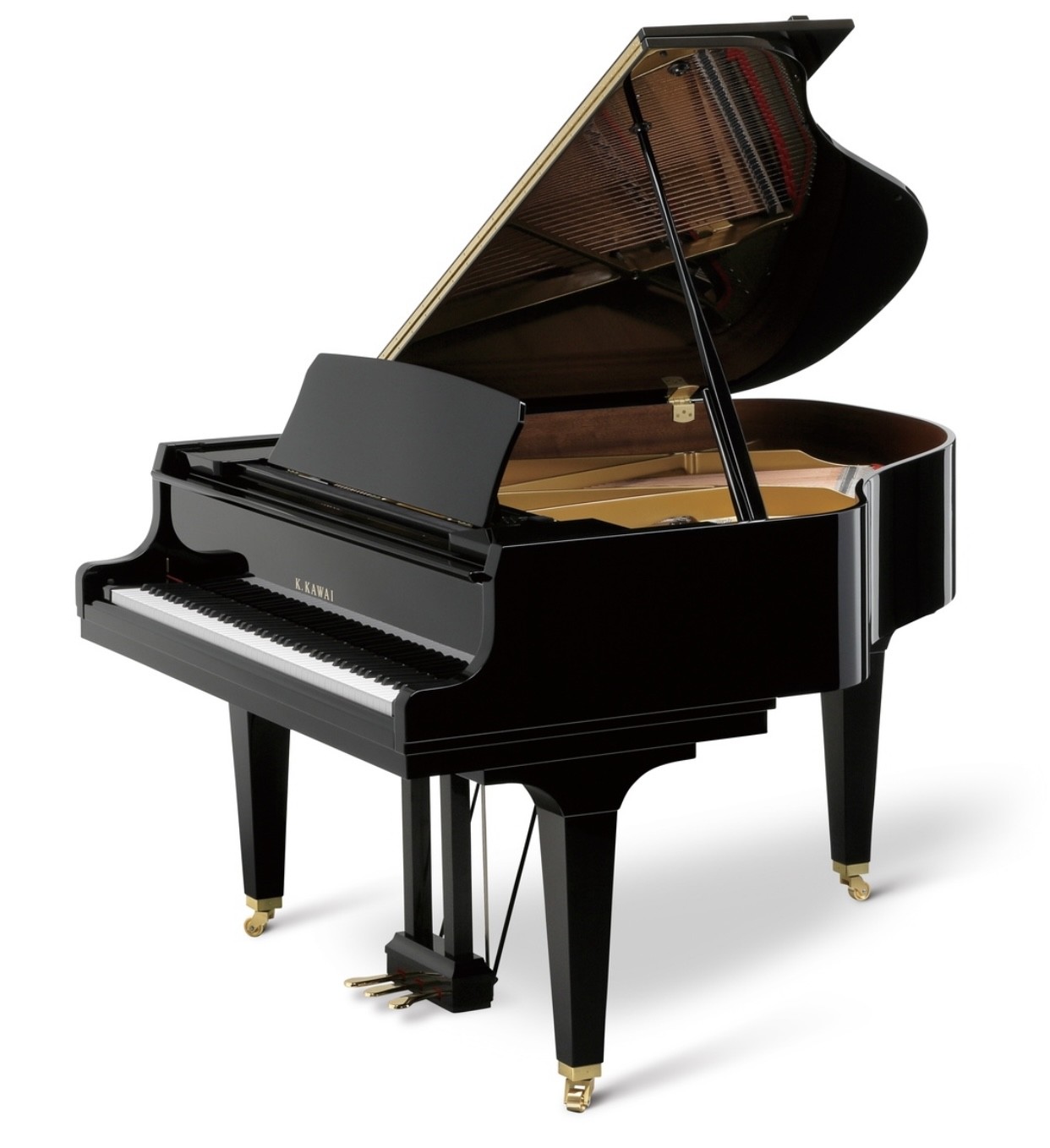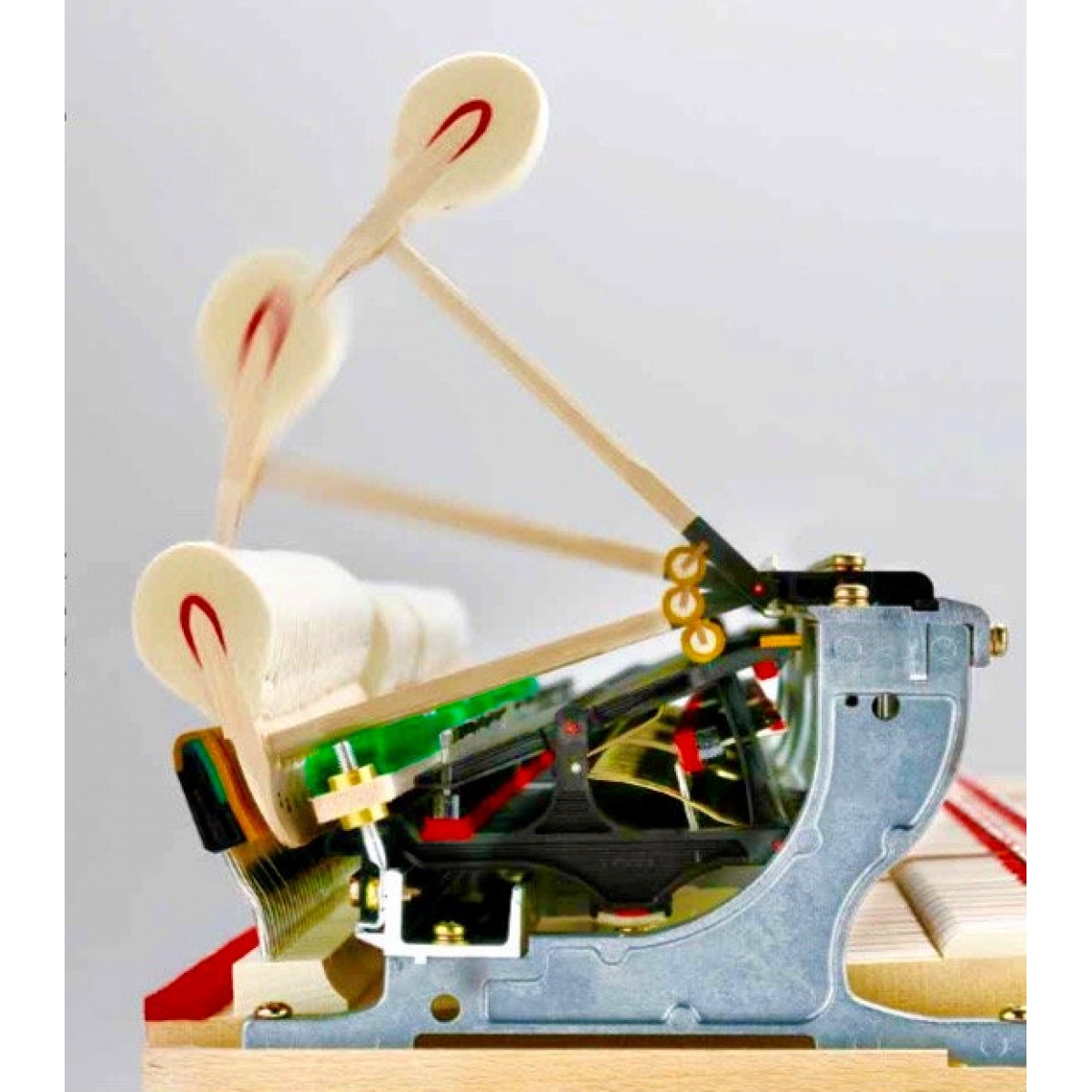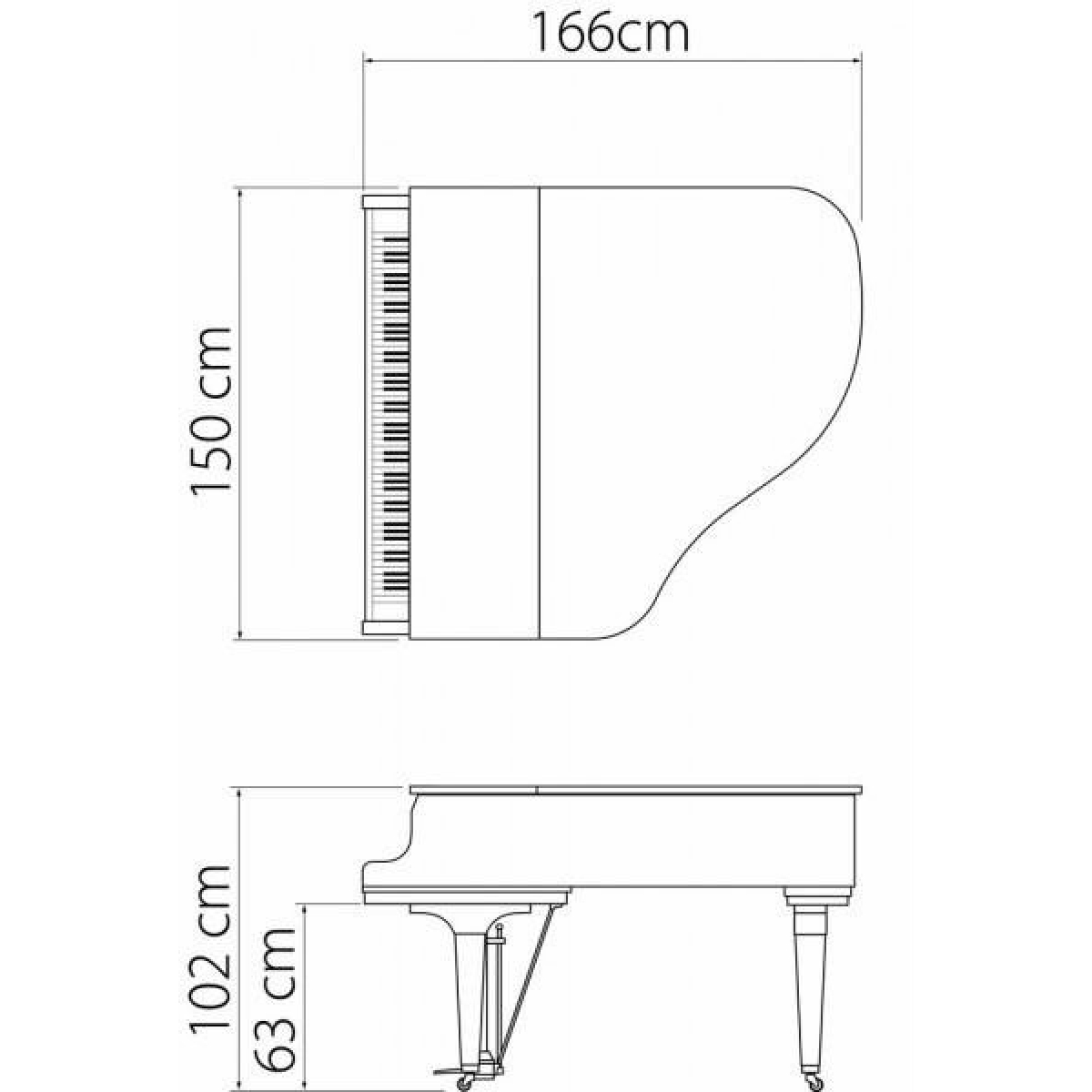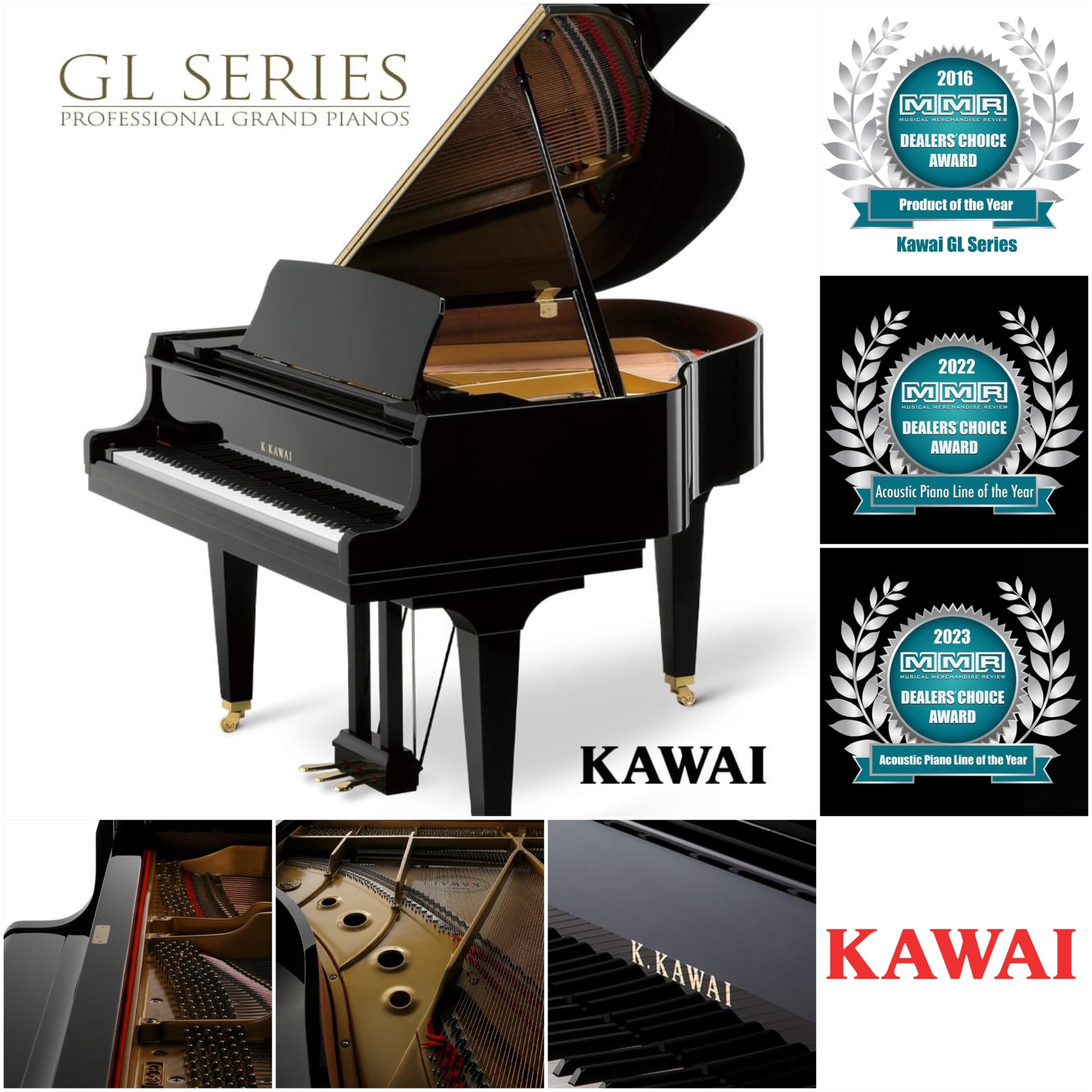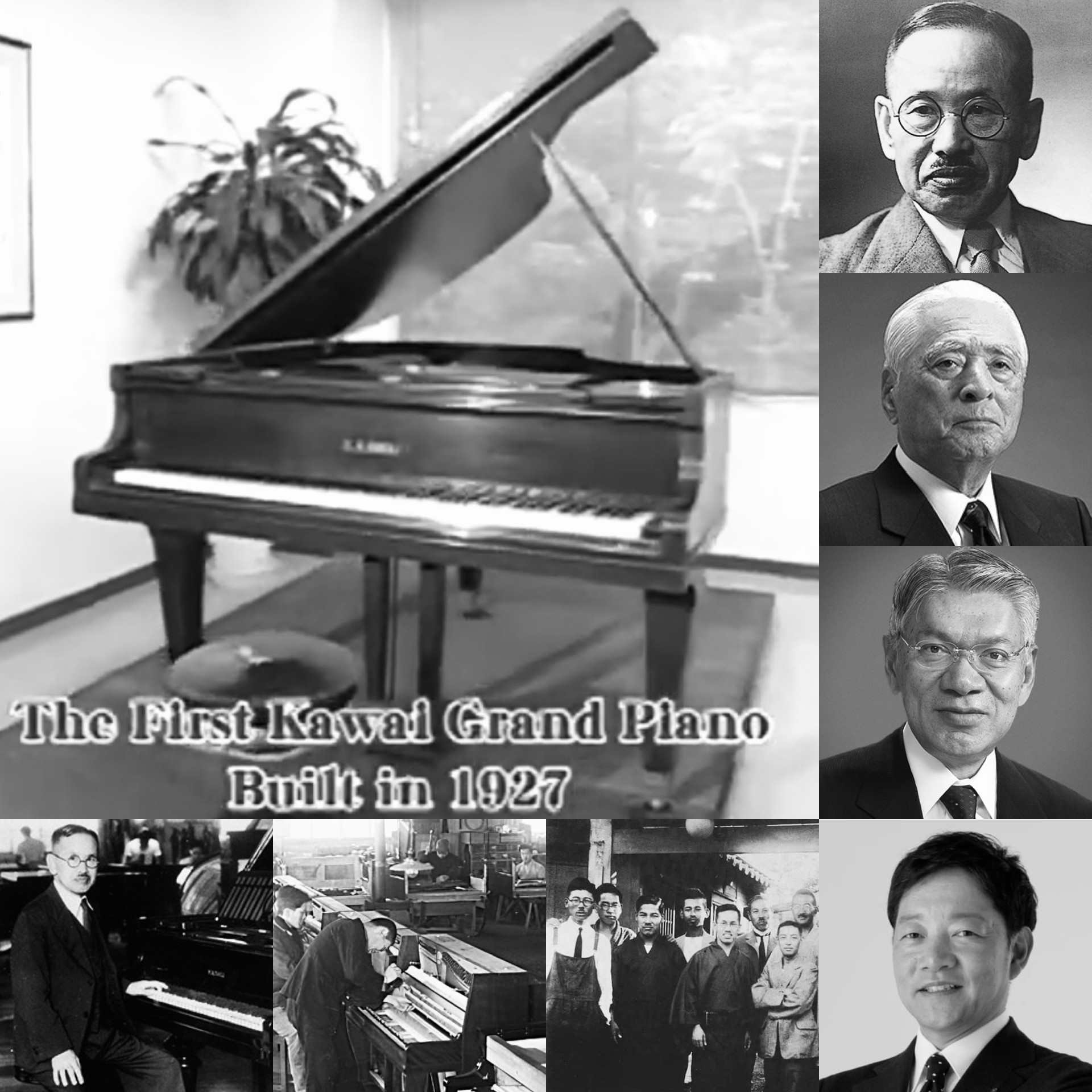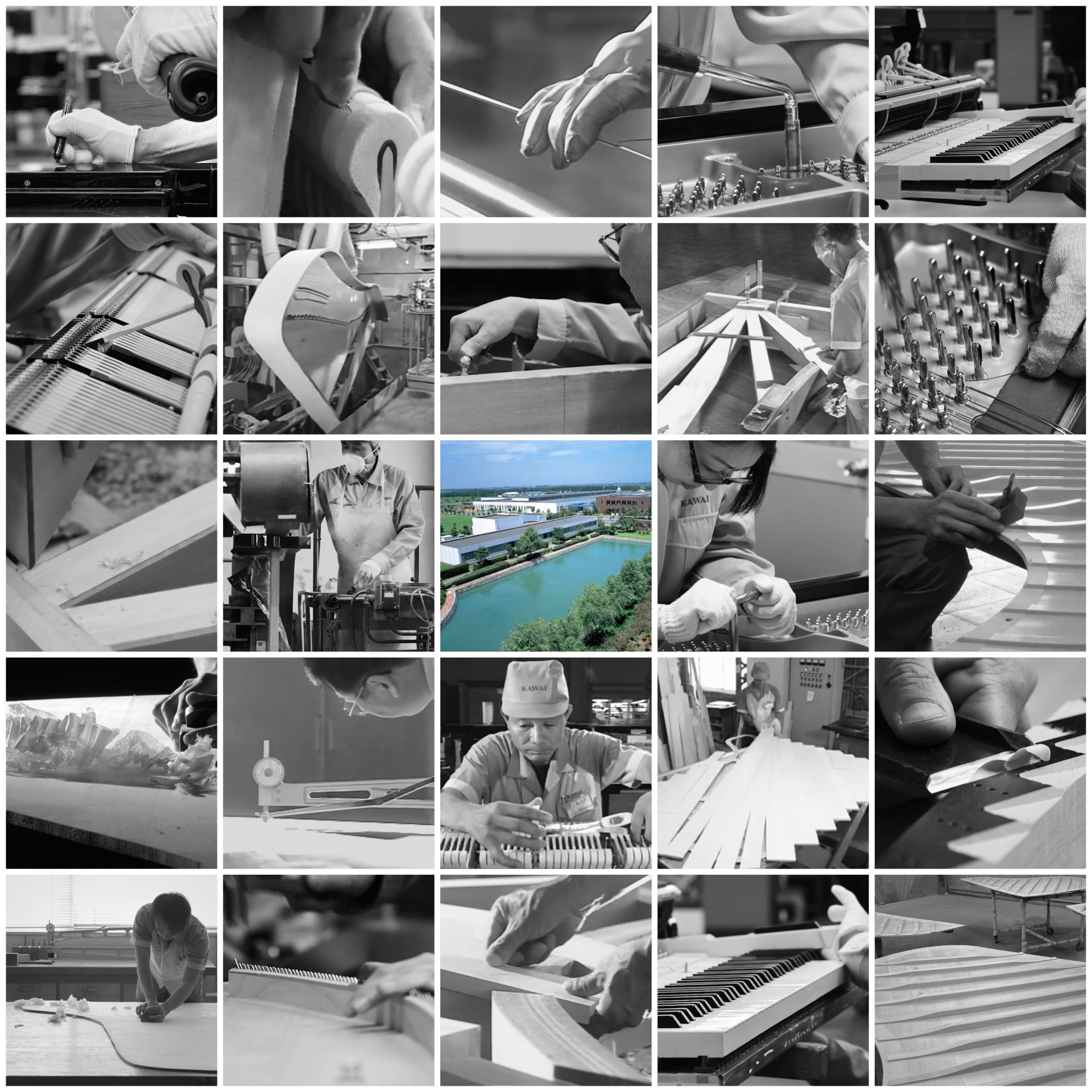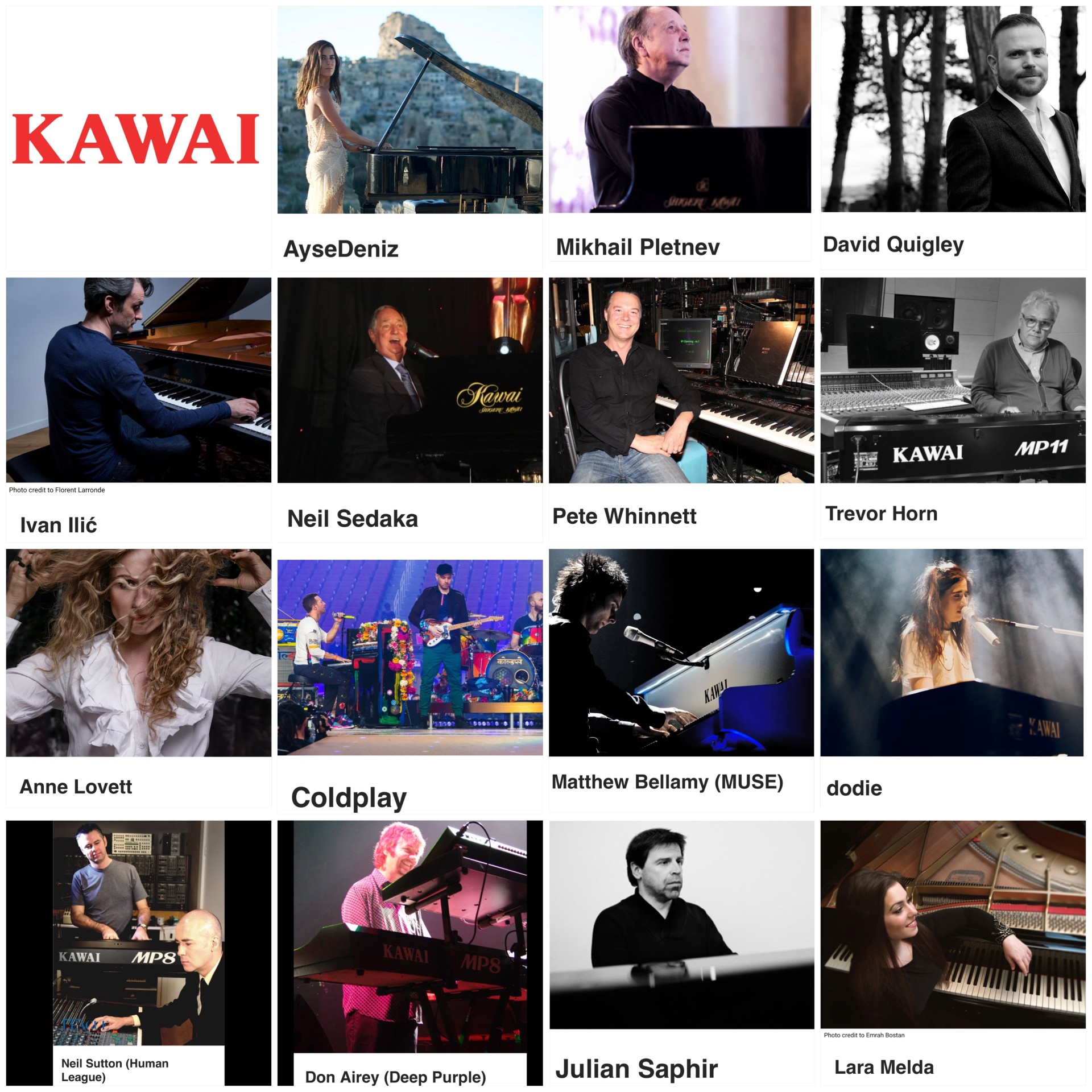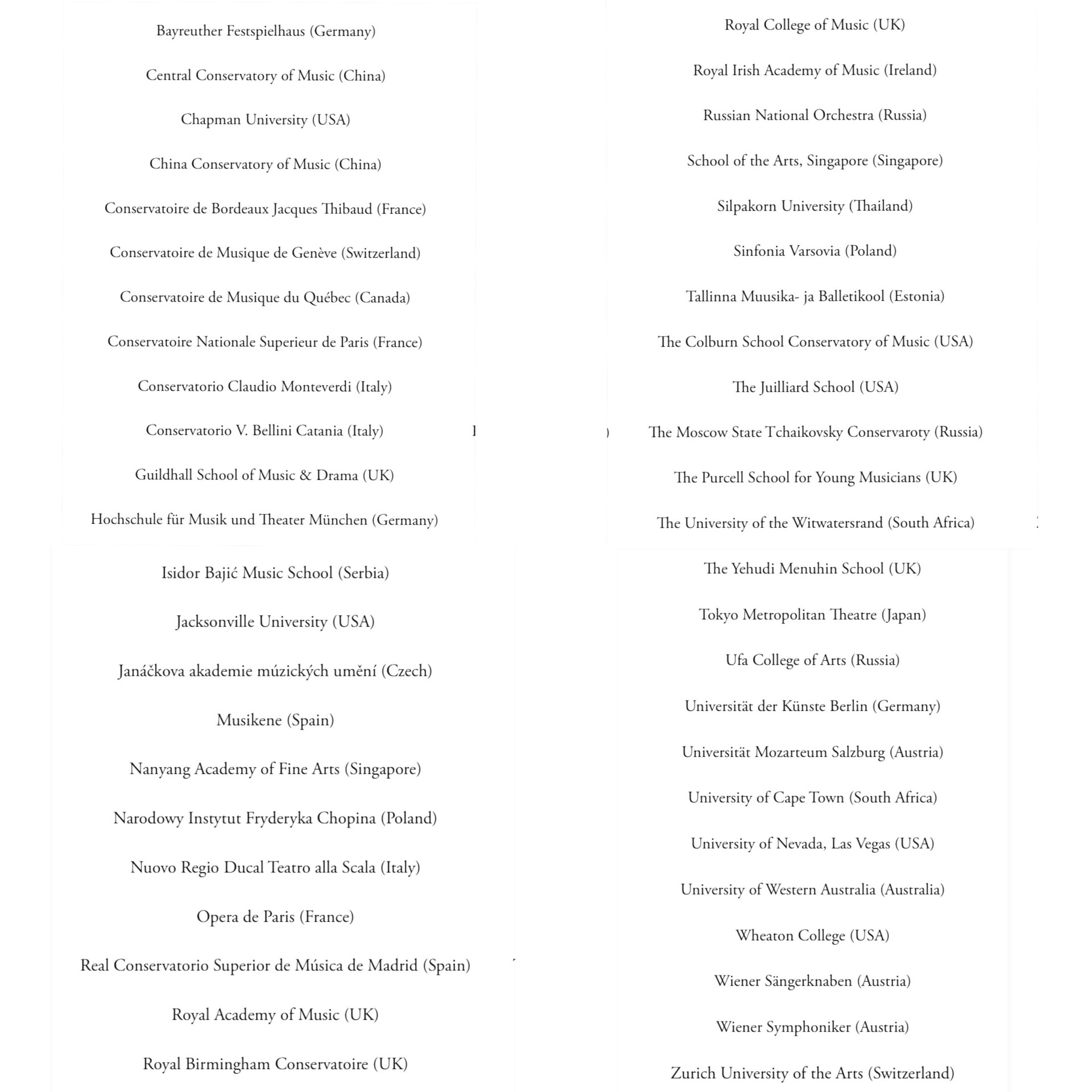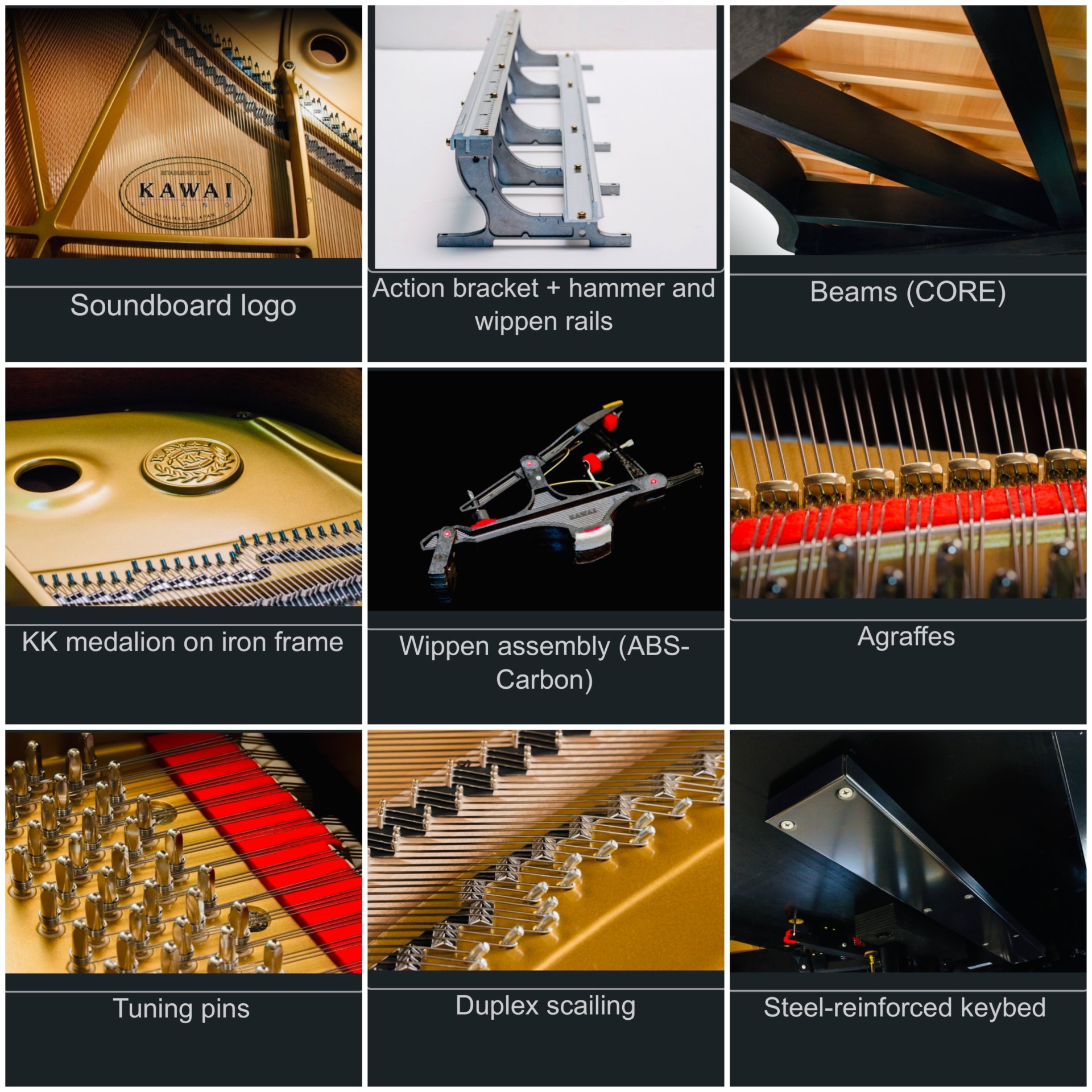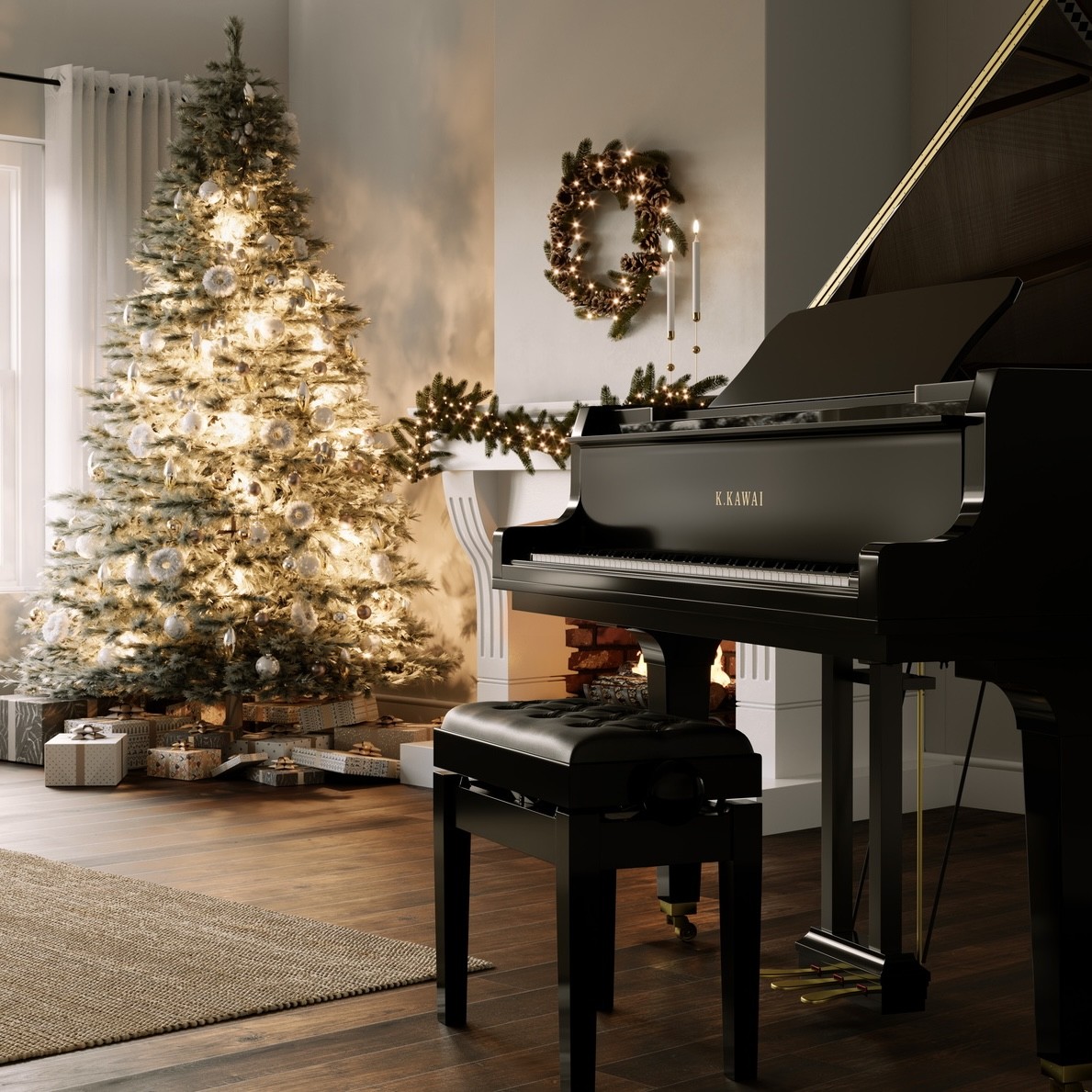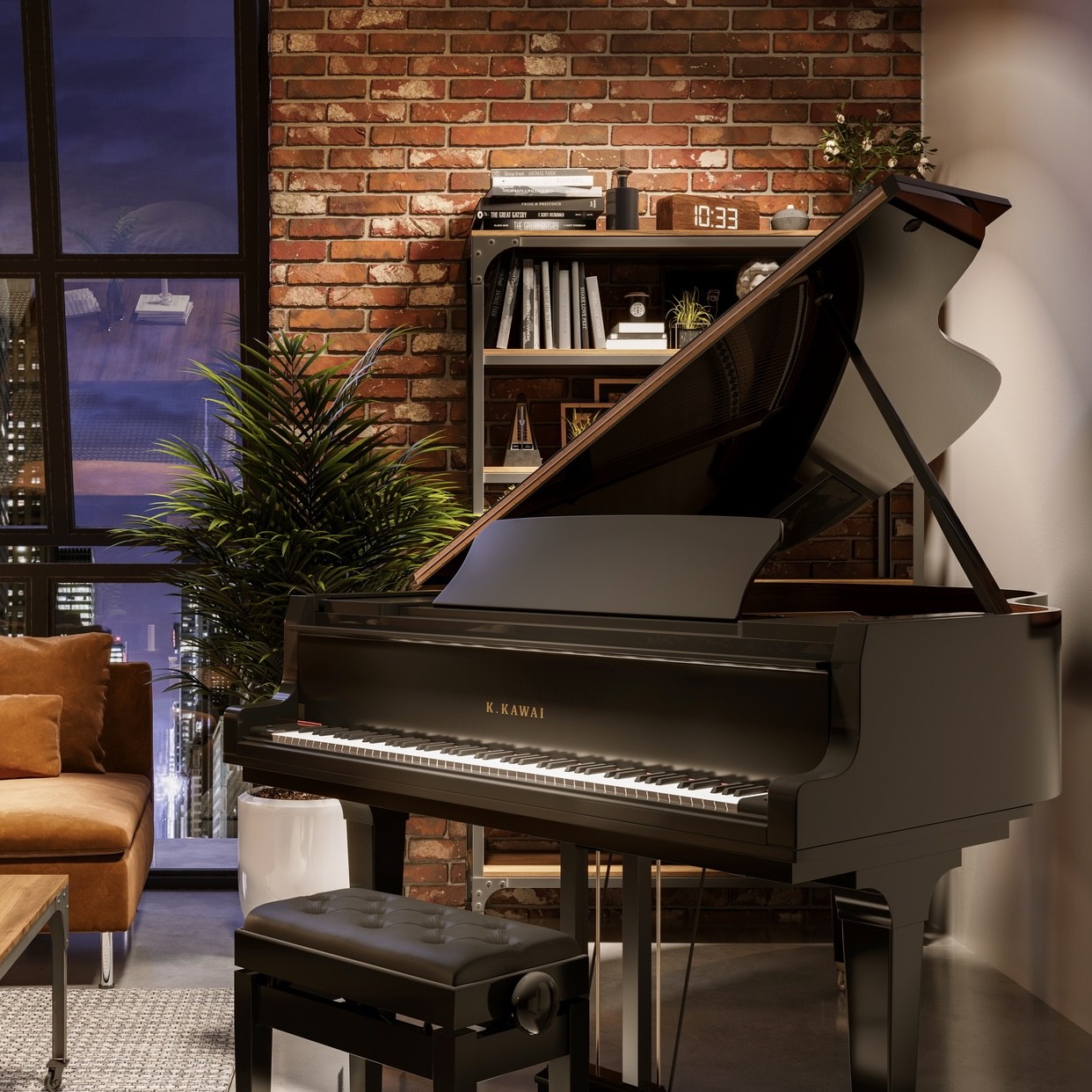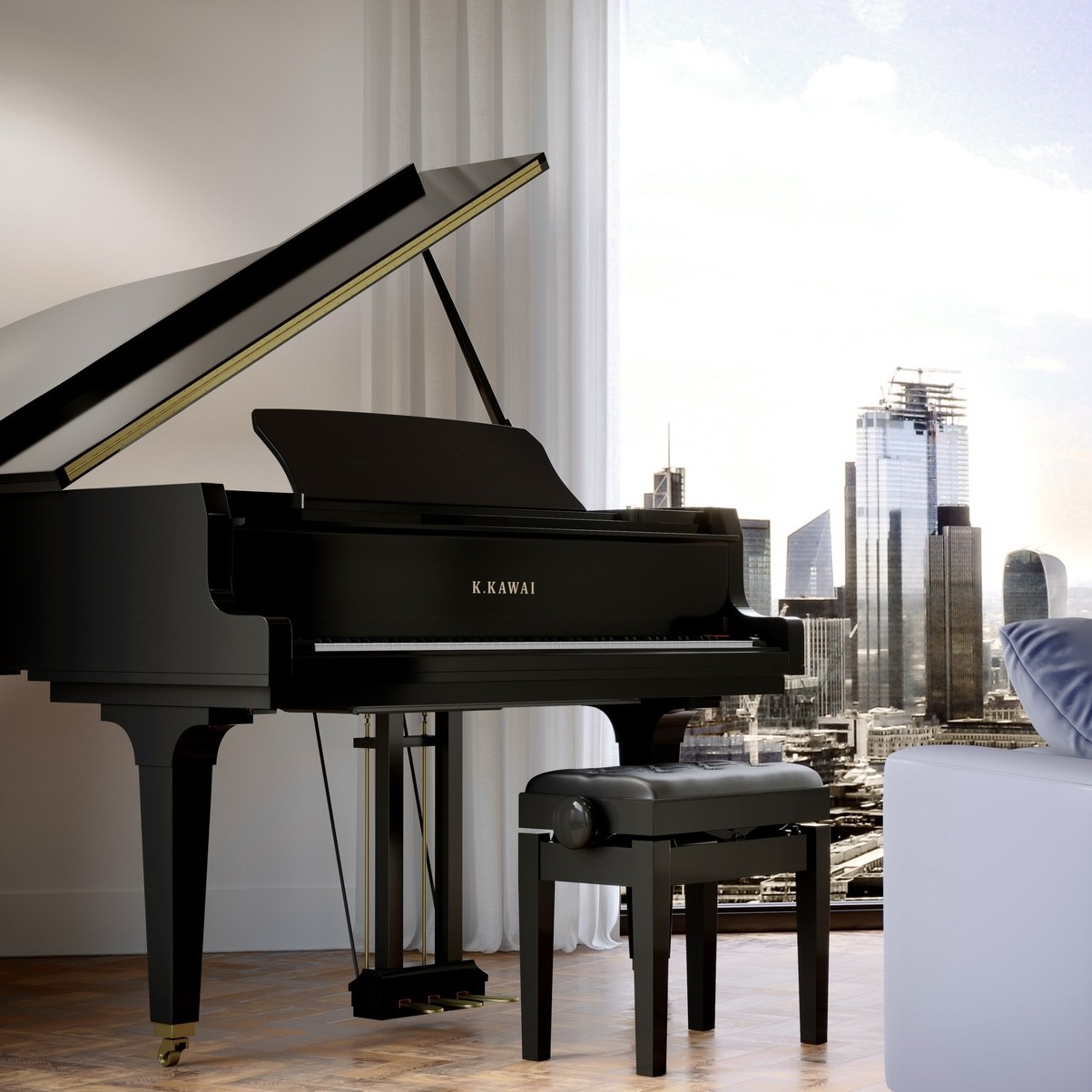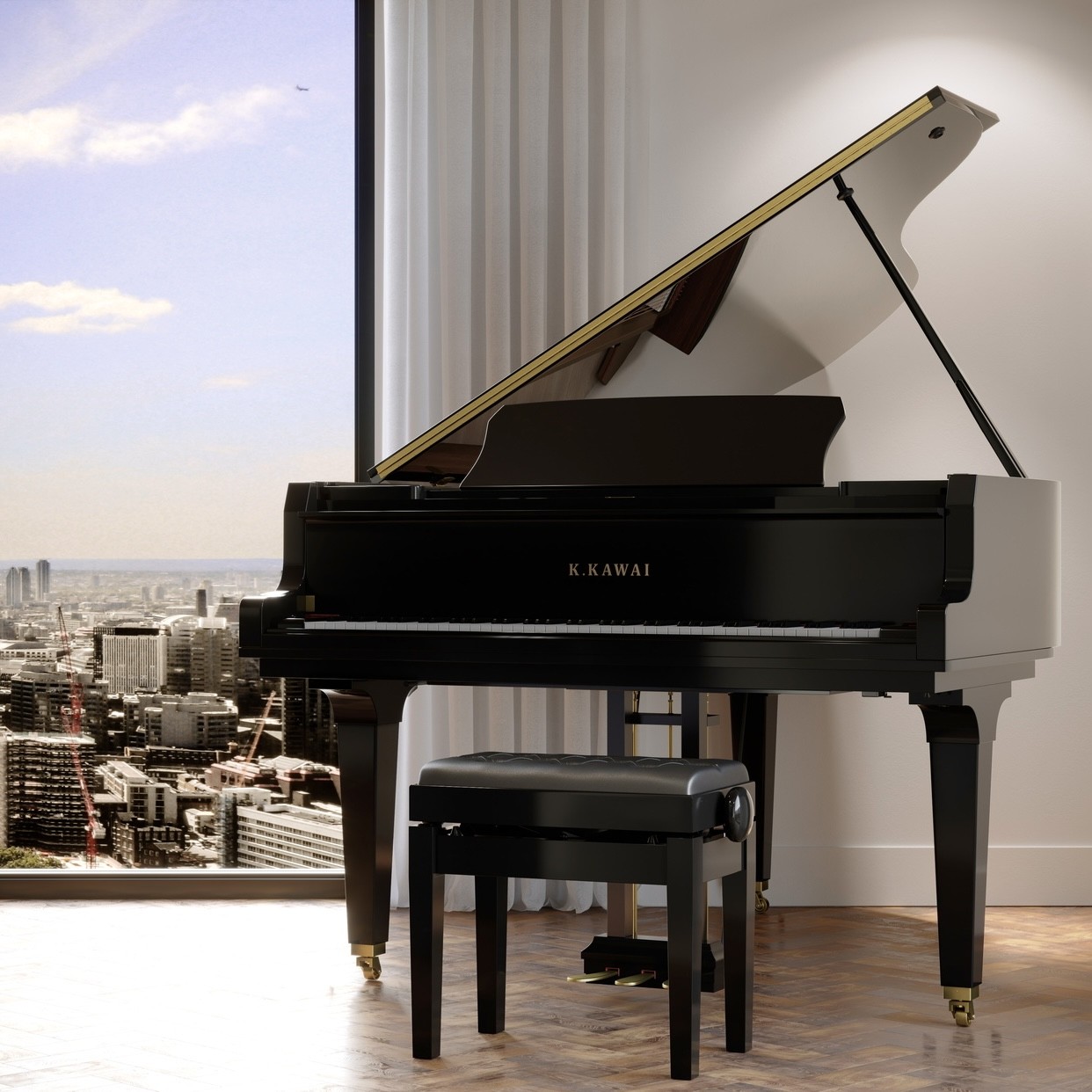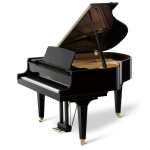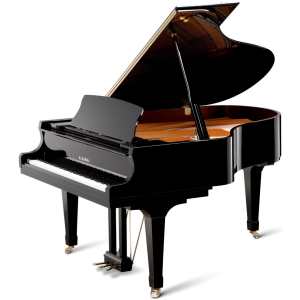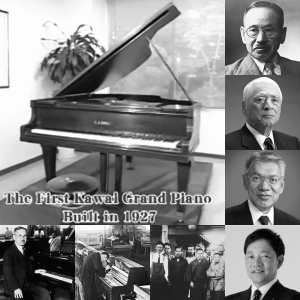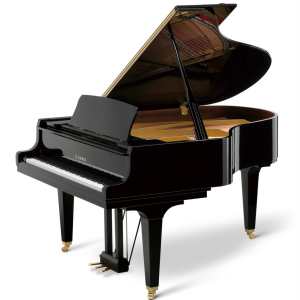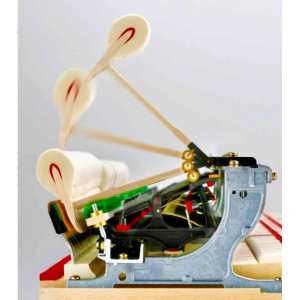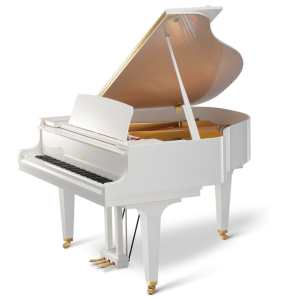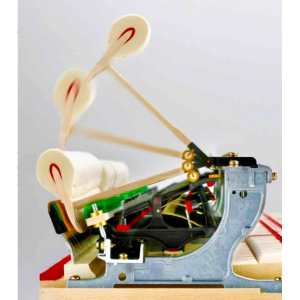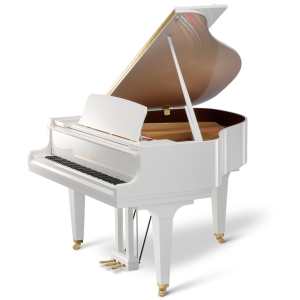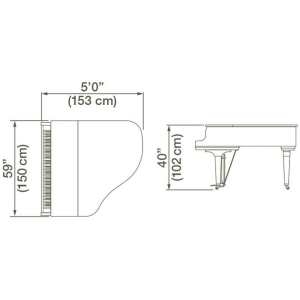Promenade Music is proud to be a Main UK Dealer for the Kawai GL Series grand pianos. At 166cm (5’5″), the Kawai GL30 in Polished Ebony [Black] is the first Japanese made grand that Kawai make with Duplex scaling (which enhances treble register harmonics, overtones, and sympathetic resonance). The series possess all the essential qualities that have made Kawai pianos a preferred choice of pianists and educators since 1927. It was conceived with one goal in mind, to provide exceptional touch and tone that endures by using state-of-the art materials and ideas to advance the piano art form. Building on experience and tradition, Kawai’s celebrated technology delivers extraordinary touch and tone that is respected worldwide for its remarkable stability.
What are the main differences between the Kawai GL30 and GL10?
– GL30 has a length of 166cm / 5’5″ [GL10 is 153cm / 5′]
– GL30 is made in Japan [GL10 is made in Indonesia]
– GL30 has Duplex Scaling to enhance the treble register harmonics [GL10 doesn’t have it]
– GL30 has 3 inner rim strengthening beams [GL10 has 2]
Call Promenade Music on 01524 410202 or email [email protected] for more information.
More Information about Kawai Pianos.
The Kawai Family … Four Generations of Kawai Family Involved in Piano Making Since 1927
Kawai was founded in Hamamatsu [Japan] in August 1927 by Koichi Kawai (1886-1955) who had previously been an apprentice to Torakusu Yamaha (1851-1916). After Mr. Yamaha’s death, Koich left the team – who had taken over the control of Yamaha’s business – to build his own piano business. An extraordinary genius for design and innovation, Koichi had a never-ending quest for perfection which saw the foundations of great things for the Kawai company. After his sudden death in 1955, his son Shigeru Kawai (1922-2006) took over the company and advanced it into the realm of modern manufacturing. After Shigeru’s retirement in 1989, the company passed to his son, Hirotaka Kawai (1947-2024) who carried on the ‘commitment to excellence’, that was established by his father and grandfather, by incorporating advanced robotics into the production process. Following Hirotaka’s death in 2024, the presidency of the company passed to his son, Kentaro Kawai, the fourth generation Kawai to run what is now, one of the greatest and foremost award-winning piano makers in the world.
Kawai Players
Kawai have an honorable list of distinguished artists from every music genre and their testimonies of Kawai products. In the Players in The Classical Music World include: Mikhail Pletnev, Kenji Miura, Luke Jones, Mark Nixon, Can Çakmur, Ivan Ilić, David Quigley, Julian Saphir, Ashley Fripp, Anne Lovet, Lara Melda; and Players in The Popular Music World include: Chris Martin of Coldplay, Matthew Bellamy of MUSE, Neil Sedaka, Yoshiki, Neil Sutton of Human League, Ryan Tedder of OneRepublic, Rod Argent of The Zombies, Marty Grebb [Worked with: Willie Nelson, B.B. King, Olivia Newton-John], Don Airey [Worked with: Gary Moore, Ozzy Osbourne, Judas Priest, Black Sabbath, etc], Steve Nieve [Worked with: Sting, McCartney, Bowie, Bono, Springsteen], Trevor Horn [Worked with: Rod Stewart, Robbie Williams, John Legend, Seal] and David Witham [George Benson, Lee Ritenour, Brecker Brothers, Patti Austin] … to name but a few.
Institutions with Kawai Pianos
Promenade Music supplies educational institutions in the UK. There are many halls, conservatories and universities all over the world using Kawai pianos daily. It is impossible to name them all – as there are too many to name – but they include pianos in: England (Royal College of Music, Royal Academy of Music, Trinity Laban, Guildhall, Birmingham Conservatoire, Menuhin School, Purcell School); Ireland (Royal Irish Academy); Austria (Vienna Phil, Graz Opera, Wiener Symphony, Mozarteum Uni, Graz Uni, Anton Bruckner Uni, Vienna Conservatoire); Belgium (Royal Conservatoires of Brussels, Antwerp, Liège and Etterbeek); France (Paris Opera, Paris Conservatoire, Lyon Conservatoire, Bordeaux Conservatoire); Germany (Munich Conservatoire, Frankfurt Uni, Cologne Uni, Duisburg Opera, Hannover Uni, Hamburg Uni, Stuttgart Uni, Berlin Uni, Düsseldorf Opera, Freiburg Uni, Robert Schumann Uni, Folkwang Uni); Poland (Fryderyk Chopin Institute); Italy (La Scala Opera); The Netherlands (Amsterdam Conservatoire, Hague Conservatoire, Utrecht Uni, Prince Claus Conservatoire, Metropole Orchestra, Groningen Conservatoire, Hilversum Conservatoire); Russia (Russian National Orchestra, Tchaikovsky Conservatoire Moscow, Ufa Institute); Spain (Madrid Conservatoire, Sevilla Conservatoire, Granada Conservatoire, Málaga Conservatoire, Almería Conservatoire, Valencia Conservatoire); Switzerland (Zurich Uni, Geneve Conservatoire, Lugano Conservatoire, Swiss Jazz School, Buchs Conservatoire); Canada (Québec Conservatoire, Glenn Gould School Conservatoire, Alberta Uni, British Columbia Uni, British Columbia Uni, Toronto Uni, Vancouver Academy, etc); USA (The Juilliard School, Chapman Uni, Jacksonville Uni, Lincoln Center Arts, MIT Massachusetts, Saint Louis Opera Theatre, California Uni, Chicago Uni, Nevada Uni, Washington Uni, Wheaton College); China (National Centre for the Performing Arts, and the Conservatoires of Shanghai, Sichuan, Xian, Shenyang, and Tianjin); South Africa (Cape town Uni).
If you are a UK instiution looking at Kawai pianos, please call Promenade Music on 01524 410202 for more information.
Kawai at Internationals Competitions
The following list is where pianist chose to play a Kawai piano and were the 1st Place Prize Winners at the following international piano competitions.
The 8th Sydney International Piano Competition in Australia ….. The 1st International Music Competition Harbin China ….. The 42nd ARD International Music Competition in Germany ….. The 2nd and 5th Dublin International Piano Competitions in Ireland ….. The 1st Citta di Cantu International Piano and Orchestra Competition in Italy ….. The 45th Ferrucio Busoni International Piano Competition in Italy ….. The 8th Premio Dino Ciani International Competition in Italy ….. The 22nd, 25th, 27th and 30 Alessandro Casagrande International Piano Competitions in Italy ….. The 2nd, 9th and 10th Hamamatsu International Piano Competitions in Japan ….. The 6th and 8th Sendai International Music Competitions in Japan ….. The 8th Sendai International Music Competition in Japan ….. The 12th Vianna da Motta International Music Competition in Macao ….. The 10th International Tchaikovsky Competition in Russia ….. The 2nd International Rachmaninov Piano Competition in Russia …. The 1st and 2nd Isidor Bajic International Piano Competitions in Serbia …… The 11th Santander International Piano Competition in Spain ….. The 13th Jose Iturbi International Music Competition in Spain ….. The 14th, 20th and 21st Jose Iturbi International Music Competition in Spain ….. The 9th Van Cliburn International Piano Competition in the USA ….. The 23rd William Kapell International Piano Competition the USA. In addition to the above listed competitions, Kawai have been selected as an official piano for a number of international piano competitions around the world.
All Wood Actions vs Kawai’s Millennium III Action Made of Wood & ABS-Carbon Components
Although wood is a wonderful material for the sound producing elements of a piano – like the soundboard, rim and hammers – it’s not great for some of the 8,000 parts in an action because it isn’t always as stable as we would like and can suffer from hummidity variations. The only material that piano inventors like Cristofori (who created the first piano action in the early 1700’s) and Erard (who created the double escapement action in the early 1800’s) had to work with in their day was wood; and I’m pretty sure if they were around today, they too would be using the most modern composites for the mechanical action parts as this is one of the parts of the piano that needs to be exacting and have unchanging precision, which wood can’t always guarantee because of its instability because of climatic changes. Kawai – like many leading companies in other industries – have moved towards the use of carbon-fibre to enhance performance of their products [think how carbon-fibre composities have made their way into improvements in tennis rackets, golf clubs, aircrafts, race cars, racing boats and performance cycles] and Kawai’s pianos have benefited from improvements to hammer strike (often flawed on pianos because of misaligned hammers due to the swelling and shrinkage in ‘all wood’ actions). Through composite action parts like ABS-carbon wippens, flanges and damper levers – which are impervious to hummidity change – Kawai hammers, strike the string with greater precision and the pianos maintain better touch and tone over long-periods of time. In our opinion, the Millennium III action is ‘best in class’ as its lighter weight and tremendous strength makes its playing speed, power and control the best action in its price point, and probably one of the main reasons why Kawai have one over 50 international awards for excellence. [David Wood, Promenade Music].
Call Promenade Music on 01524 410202 or email [email protected] for more information.

